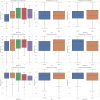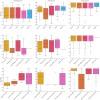The state of iodine deficiency in Kyrgyzstan: Insights from studies of knowledge, attitudes and practices
- PMID: 39570819
- PMCID: PMC11581218
- DOI: 10.1371/journal.pone.0313869
The state of iodine deficiency in Kyrgyzstan: Insights from studies of knowledge, attitudes and practices
Abstract
Objective: This study aimed to assess the knowledge, attitudes, and practices (KAPs) regarding iodine deficiency among the population of Kyrgyzstan, with a focus on pregnant women, and to correlate these factors with the urinary iodine concentration (UIC).
Methods: A cross-sectional study was conducted using structured questionnaires and urine sample analysis to evaluate iodine status. A multistage stratified sampling method ensured a representative sample from both urban and rural areas. Descriptive statistics were used to summarize demographic characteristics and KAP variables, whereas chi-square tests and multivariate logistic regression analysis were used to identify predictors of KAP outcomes.
Results: The study included 690 participants, with balanced representation from both urban and rural areas. The mean knowledge score was moderate, with significant gaps in the understanding of iodine deficiency. The participants generally had positive attitudes toward iodine intake but exhibited suboptimal practices, especially in rural areas. Pregnant women demonstrated greater knowledge, but fewer practical behaviors related to iodine intake. Compared with rural participants, urban participants had higher UIC levels, indicating better iodine nutrition. Multivariate regression analysis revealed that residence, knowledge, attitudes, and practices significantly influenced UIC levels.
Conclusion: Despite existing iodization programs, significant gaps remain in the knowledge and practices related to iodine intake, particularly in rural areas. This study highlights the need for targeted public health interventions to improve iodine nutrition and reduce the burden of iodine deficiency disorders in Kyrgyzstan. Enhancing public health education, improving the accessibility and affordability of iodized salt, and regularly monitoring the iodine status are essential strategies for addressing these issues.
Copyright: © 2024 Chyngyshpaeva et al. This is an open access article distributed under the terms of the Creative Commons Attribution License, which permits unrestricted use, distribution, and reproduction in any medium, provided the original author and source are credited.
Conflict of interest statement
The authors have declared that no competing interests exist.
Figures




Similar articles
-
Regional Influences on Nutritional Iodine Status of Pregnant Women in Pakistan.Thyroid. 2018 Nov;28(11):1538-1546. doi: 10.1089/thy.2017.0267. Thyroid. 2018. PMID: 30311856
-
Cross-sectional study of maternal iodine nutrition and salt iodization in Kyrgyzstan: urban-rural and socioeconomic factors.Int Health. 2025 Jul 16:ihaf076. doi: 10.1093/inthealth/ihaf076. Online ahead of print. Int Health. 2025. PMID: 40665931
-
The current salt iodization strategy in Kyrgyzstan ensures sufficient iodine nutrition among school-age children but not pregnant women.Public Health Nutr. 2010 May;13(5):623-30. doi: 10.1017/S136898000999200X. Epub 2009 Nov 16. Public Health Nutr. 2010. PMID: 19912674
-
Prevalence of iodine deficiency and associated factors among pregnant women in Ada district, Oromia region, Ethiopia: a cross- sectional study.BMC Pregnancy Childbirth. 2018 Jun 25;18(1):257. doi: 10.1186/s12884-018-1905-z. BMC Pregnancy Childbirth. 2018. PMID: 29940879 Free PMC article.
-
Iodine status and knowledge among pregnant and lactating women in Large City in Northern China after nearly 30 years of the universal salt iodization.Eur J Nutr. 2024 Oct;63(7):2753-2766. doi: 10.1007/s00394-024-03465-0. Epub 2024 Jul 19. Eur J Nutr. 2024. PMID: 39030442
References
-
- Zimmermann MB, Boelaert K. Iodine deficiency: Prevention and monitoring. Lancet Diabetes Endocrinol. 2023;11(1):24–34. Available from: doi: 10.1016/S2213-8587(22)00308-9 - DOI
-
- Lazarus JH, Smyth PPA, Zimmermann MB. Iodine deficiency in Europe: Current status, future prospects. Thyroid. 2022;32(2):143–9.
MeSH terms
Substances
LinkOut - more resources
Full Text Sources
Medical

